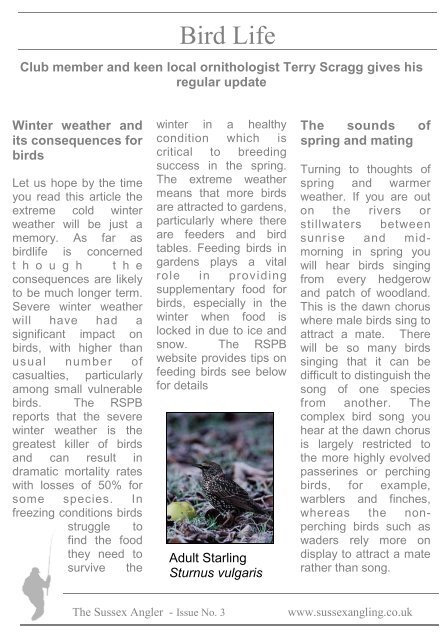pet bog magazine 3rd issue 10-2-10 - Petworth and Bognor Angling ...
pet bog magazine 3rd issue 10-2-10 - Petworth and Bognor Angling ...
pet bog magazine 3rd issue 10-2-10 - Petworth and Bognor Angling ...
You also want an ePaper? Increase the reach of your titles
YUMPU automatically turns print PDFs into web optimized ePapers that Google loves.
Winter weather <strong>and</strong><br />
its consequences for<br />
birds<br />
Let us hope by the time<br />
you read this article the<br />
extreme cold winter<br />
weather will be just a<br />
memory. As far as<br />
birdlife is concerned<br />
t h o u g h t h e<br />
consequences are likely<br />
to be much longer term.<br />
Severe winter weather<br />
will have had a<br />
significant impact on<br />
birds, with higher than<br />
usual number of<br />
casualties, particularly<br />
among small vulnerable<br />
birds. The RSPB<br />
reports that the severe<br />
winter weather is the<br />
greatest killer of birds<br />
<strong>and</strong> can result in<br />
dramatic mortality rates<br />
with losses of 50% for<br />
some species. In<br />
freezing conditions birds<br />
struggle to<br />
find the food<br />
they need to<br />
survive the<br />
Bird Life<br />
Club member <strong>and</strong> keen local ornithologist Terry Scragg gives his<br />
regular update<br />
winter in a healthy<br />
condition which is<br />
critical to breeding<br />
success in the spring.<br />
The extreme weather<br />
means that more birds<br />
are attracted to gardens,<br />
particularly where there<br />
are feeders <strong>and</strong> bird<br />
tables. Feeding birds in<br />
gardens plays a vital<br />
role in providing<br />
supplementary food for<br />
birds, especially in the<br />
winter when food is<br />
locked in due to ice <strong>and</strong><br />
snow. The RSPB<br />
website provides tips on<br />
feeding birds see below<br />
for details<br />
Adult Starling<br />
Sturnus vulgaris<br />
The Sussex Angler - Issue No. 3<br />
The sounds of<br />
spring <strong>and</strong> mating<br />
Turning to thoughts of<br />
spring <strong>and</strong> warmer<br />
weather. If you are out<br />
on the rivers or<br />
stillwaters between<br />
sunrise <strong>and</strong> midmorning<br />
in spring you<br />
will hear birds singing<br />
from every hedgerow<br />
<strong>and</strong> patch of woodl<strong>and</strong>.<br />
This is the dawn chorus<br />
where male birds sing to<br />
attract a mate. There<br />
will be so many birds<br />
singing that it can be<br />
difficult to distinguish the<br />
song of one species<br />
from another. The<br />
complex bird song you<br />
hear at the dawn chorus<br />
is largely restricted to<br />
the more highly evolved<br />
passerines or perching<br />
birds, for example,<br />
warblers <strong>and</strong> finches,<br />
whereas the nonperching<br />
birds such as<br />
waders rely more on<br />
display to attract a mate<br />
rather than song.<br />
www.sussexangling.co.uk


